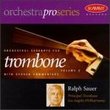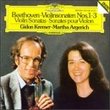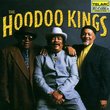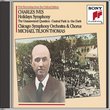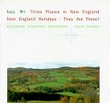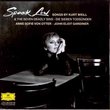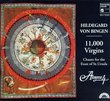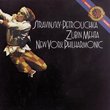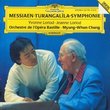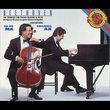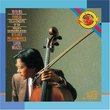| All Artists: Philip Glass Title: Satyagraha Members Wishing: 1 Total Copies: 0 Label: CBS Records Masterworks Release Date: 10/25/1990 Album Type: Box set Genres: Dance & Electronic, International Music, Jazz, Classical Styles: Techno, Opera & Classical Vocal, Historical Periods, Modern, 20th, & 21st Century Number of Discs: 3 SwapaCD Credits: 3 UPC: 074643967228 |
Search - Philip Glass :: Satyagraha
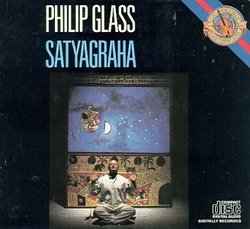 | Philip Glass Satyagraha Genres: Dance & Electronic, International Music, Jazz, Classical
Satyagraha remains, decades after its composition, one of Philip Glass's most traditional works. An emphasis on strings and on courtly, European-toned small choruses lends the opera a sense of musical familiarity rarely ev... more » |
Larger Image |
CD DetailsSynopsis
Amazon.com Satyagraha remains, decades after its composition, one of Philip Glass's most traditional works. An emphasis on strings and on courtly, European-toned small choruses lends the opera a sense of musical familiarity rarely evidenced in the composer's extensive catalog. The libretto, though written in Sanskrit, is often mistakable, sonorously, for Italian. Satyagraha's relative independence from the internecine Indian raga-like patterns of the composer's other long-form work is particularly ironic given the opera's subject: Mahatma Ghandi, whose native country's ritual culture and spiritual heritage have long informed Glass's music. This is no dramatic biography; following a mythological gambit, the scenes focus on a handful of specific events in Ghandi's long life (the construction of a communal farm, his tumultuous arrival in Durban, the publication of the weekly broadside Indian Opinion). Pointedly, the opera is an international affair, each of its three acts referencing a major cultural figure: Leo Tolstoy, Rabindranath Tagore, and Martin Luther King Jr. The music is most interesting when Glass draws parallels between his patented, minimalist patterns and standard classical mode. --Marc Weidenbaum Similar CDs
Similarly Requested CDs |
CD ReviewsUnjustly ignored illustratioin of Glass's capabilities Kevin Currie-Knight | Newark, Delaware | 09/23/2002 (4 out of 5 stars) "As part of a trilogy of 'portrait operas,' Glass tells us in the liner notes that each opera deliberately has a different flavor. "Einstein on the Beach" had an electronic, mathematical and tense feel. "Akhnaten," a floating yet grand orchestral quality and this, "Satyagraha," then, is somewhere in between with a very sparsely orchestrated, contemplative design. So sparse and light is the music here, that much of the opera utilizes one section of the orchestra at a time playing unison harmonies. Was this deliberate, or did Glass simply not feel comfortable writing for orchestra after writing for the Glass ensemble? Well, that's debateable but for my money, I think "Satyagraha's" terseness deliberate and spectacular. So why do I say this opera is 'unjustly ignored'? Well, there are two types of Glass fans. First, the hard minimalists who like most of the Glass ensemble's electronic works, like Einstein and Music for Twelve Parts. Then, there are the newer Glass fans, who like his more traditional, orchestral works, like the Low Symphony and his film scores. The problem is that "Satyagraha" is the pivot between the two and has alienated both fans. It is very close to Glass's earlier style in it's insistent repititon with slight variations that the will bore the orchestral fans but the Glass ensemble fans will feel cheated by the warm orchestral touch. So this great opera has fallen through the cracks by defying categorization in the Glass repitoire. To confess my bias, I am much more a fan of Glass's old style (Yes, I've listened to Einstein straight through!). This opera, though, has one thing that neither of the other two (or, god help us, his chamber opera) have is a certain purity. Here, Glass is a orchestra novice and as such, is very conservative, keeping many techniques of the Glass ensemble and adding to them the warmth of violins, strings and operatic vocal (no percussion.) In the later acts, we do hear foreshadowing of his emerging orchestral future, but it is much more authentic than Akhnaten. I stronly reccomend that Glass fans, of old and new, listen because there is much here for both to appreciate." In 3rd place after Einstein and Akhnaten Christopher K. Koenigsberg | Norman, OK USA | 03/11/2005 (5 out of 5 stars) "My own personal entirely subjective ranking, if there must be such an abominable thing, places "Einstein on the Beach" as Glass's #1 opera, "Akhnaten" as #2, and "Satyagraha" as #3. (I've never gotten much into any of his many subsequent operas; I have tried here and there, but they do not appeal to me yet; perhaps they will begin to reach me after a few more years). That being said, Satyagraha is very very good. The music is an expansion into orchestral space, of his earlier trademark idioms. The singing is wonderful. The libretto is wonderful too. I think it marks a turning point or watershed, because it was his first step towards turning away from being totally experimental and "new"; it was his first excursion (totally different than "Einstein") into large-scale use of the traditional opera technology, e.g. orchestra and trained operatic singers. I think he then perfected this use, of the traditional opera orchestra and operatic singers, in "Akhnaten"; but "Satyagraha" is still very very good as I said." Number one Antony Sellers | Dublin Ireland | 06/21/2000 (5 out of 5 stars) "This is undoubtedly the best of Philip Glass' trilogy of 'biography' operas. The recording - achieved through overdubbing with original cast and orchestra - makes for a sound which is both magnificent, metronomic and transfixing. It's what "Einstein on the Beach" promises, and "Aknahten" glances back over the shoulder towards. As these three works are probably the best of all Glass' work, and most honest to his original intentions, this comparison should say it all."
|

 Track Listings (3) - Disc #1
Track Listings (3) - Disc #1